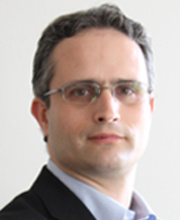Gad Getz

Gad Getz directs the Cancer Genome Computational Analysis group at the Broad Institute of MIT and Harvard, where he is an institute member. Under Getz's leadership, the Cancer Genome Analysis group has established itself as a world leader in the development and application of genomic technologies and next-generation sequencing for analyzing cancer mutations.
The Getz Laboratory specializes in cancer genome analysis which includes two major steps: (i) Characterization – cataloging of all genomic events and the mechanisms that created them during the clonal evolution of the cancer, comparing events at the DNA, RNA and protein levels between tumor and normal samples from an individual patient; and (ii) Interpretation – analysis of the characterization data across a cohort of patients with the aim of identifying the alterations in genes and pathways that cause cancer or increase its risk as well as identifying molecular subtypes of the disease, their markers and relationship to clinical variables.
In addition to his role at the Broad, Getz is a co-principal investigator in the Genome Data Analysis Center (GDAC) of the NCI/NHGRI TCGA (The Cancer Genome Atlas) project; a co-leader of the International Cancer Genome Consortium (ICGC) Pan-Cancer Analysis of Whole Genomes (PCAWG) project; a co-principal investigator of the Broad-led NCI Cloud Pilot; and a member of various NCI advisory committees. In addition, Getz directs the Bioinformatics Program at the Massachusetts General Hospital Cancer Center and Department of Pathology and serves as an associate professor of pathology at Harvard Medical School. Getz is also the inaugural incumbent of the Paul C. Zamecnik Chair in Oncology at the MGH Cancer Center. He has published numerous papers in recent years in prominent journals that describe new genes and pathways involved in different tumor types.
Getz received his B.S. degree in physics and mathematics from Hebrew University and an M.Sc. in physics from Tel-Aviv University. He later earned a Ph.D. in physics from the Weizmann Institute of Science in Israel. He completed his postdoctoral training at the Broad Institute of MIT and Harvard with Todd Golub, where he focused on developing computational tools and analyzing expression of miRNAs across cancer.
